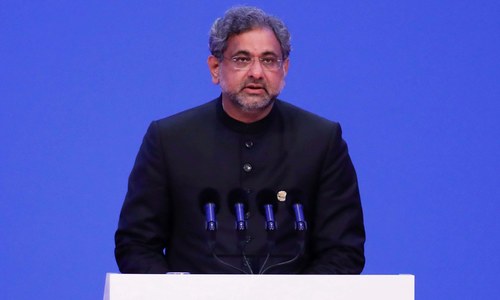Chief Justice Saqib Nisar on Friday highlighted the need to "deal with grey areas in the legal and administrative landscape which may hinder our country from taking full advantage of the numerous opportunities provided by CPEC".
He said this while delivering an address at the inaugural ceremony of the 8th Judicial Conference in Islamabad.
The conference which first began in 2006, promotes interaction between members of the legal community, academia and other associated fields. It is designed to provide a platform to share views not only on various aspects of the law but also on how to tackle obstacles which hinder the administration of justice.
Thanking the foreign delegates who were in attendance, the chief justice said: "The presence of experts from foreign jurisdictions allows us to draw on their experience and enables us to benefit from the manner in which other countries have tackled the same."
He recognised and expressed pride over the fact that Pakistan was about to achieve an important milestone in its economic development by way of the CPEC.
"In this regard deliberation and serious dialogue is required to assess the pros and cons of the CPEC and its legal, social, cultural and economic aspects and suggest ways-forward to make the CPEC a win-win situation for both Pakistan and China," he said.
Exclusive: CPEC master plan revealed
While addressing the participants the chief justice also stressed the importance of removing potential hurdles standing in the way of Foreign Direct Investment. He said that mechanisms of "Alternate Dispute Resolution" need to be placed before investment starts flowing into the country.
CJ Nisar said one of the "impediments in the expeditious dispensation of justice" is the standard of legal education and the recruitment and training of judicial officers. He said that there was an urgent need to develop uniform educational standards and institute merit-based selection of judicial officers.
Another issue which he said was "close to his heart" was the ever-mounting backlog of cases in our legal system, a "menace" which he thought only possible to "rid the nation of" if the legal and judicial systems works through a "holistic and synchronised approach".
He said that he is committed to introducing judicial reforms in order to revamp the system but it was of the utmost importance that "all relevant institutions coordinate and work together for reducing delays in finalisation of legal disputes".
He acknowledged the "strong nexus" crime has with the political and economic conditions of a country and therefore "both the limbs of the criminal justice system must be revamped, i.e., the investigation agencies as well as the criminal courts". He said that all the existent policies for both are due a reexamination.
"This will ensure that investors from other countries do not shy away from our country on account of lack of faith in the criminal justice system," he said.














































